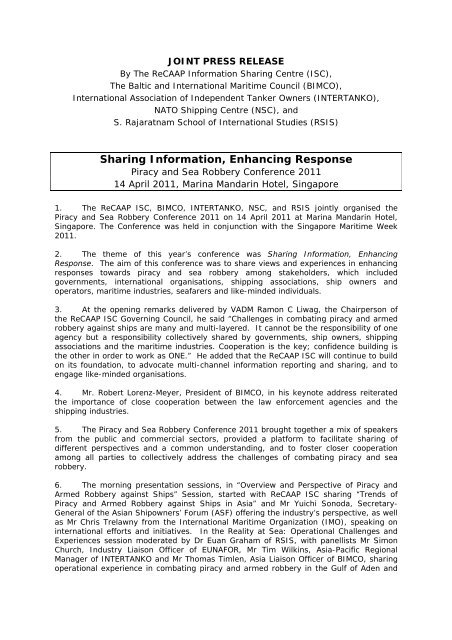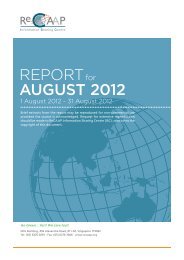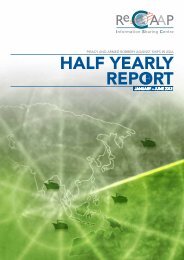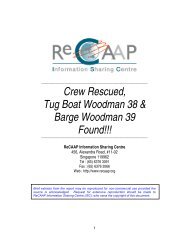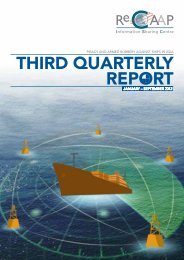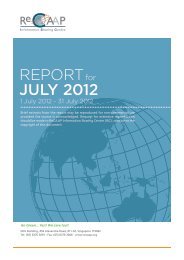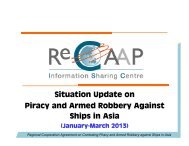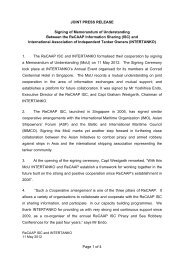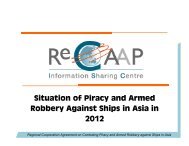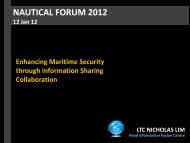Sharing Information , Enhancing Response - ReCAAP
Sharing Information , Enhancing Response - ReCAAP
Sharing Information , Enhancing Response - ReCAAP
You also want an ePaper? Increase the reach of your titles
YUMPU automatically turns print PDFs into web optimized ePapers that Google loves.
JOINT PRESS RELEASE<br />
By The <strong>ReCAAP</strong> <strong>Information</strong> <strong>Sharing</strong> Centre (ISC),<br />
The Baltic and International Maritime Council (BIMCO),<br />
International Association of Independent Tanker Owners (INTERTANKO),<br />
NATO Shipping Centre (NSC), and<br />
S. Rajaratnam School of International Studies (RSIS)<br />
<strong>Sharing</strong> <strong>Information</strong>, <strong>Enhancing</strong> <strong>Response</strong><br />
Piracy and Sea Robbery Conference 2011<br />
14 April 2011, Marina Mandarin Hotel, Singapore<br />
1. The <strong>ReCAAP</strong> ISC, BIMCO, INTERTANKO, NSC, and RSIS jointly organised the<br />
Piracy and Sea Robbery Conference 2011 on 14 April 2011 at Marina Mandarin Hotel,<br />
Singapore. The Conference was held in conjunction with the Singapore Maritime Week<br />
2011.<br />
2. The theme of this year’s conference was <strong>Sharing</strong> <strong>Information</strong>, <strong>Enhancing</strong><br />
<strong>Response</strong>. The aim of this conference was to share views and experiences in enhancing<br />
responses towards piracy and sea robbery among stakeholders, which included<br />
governments, international organisations, shipping associations, ship owners and<br />
operators, maritime industries, seafarers and like-minded individuals.<br />
3. At the opening remarks delivered by VADM Ramon C Liwag, the Chairperson of<br />
the <strong>ReCAAP</strong> ISC Governing Council, he said “Challenges in combating piracy and armed<br />
robbery against ships are many and multi-layered. It cannot be the responsibility of one<br />
agency but a responsibility collectively shared by governments, ship owners, shipping<br />
associations and the maritime industries. Cooperation is the key; confidence building is<br />
the other in order to work as ONE.” He added that the <strong>ReCAAP</strong> ISC will continue to build<br />
on its foundation, to advocate multi-channel information reporting and sharing, and to<br />
engage like-minded organisations.<br />
4. Mr. Robert Lorenz-Meyer, President of BIMCO, in his keynote address reiterated<br />
the importance of close cooperation between the law enforcement agencies and the<br />
shipping industries.<br />
5. The Piracy and Sea Robbery Conference 2011 brought together a mix of speakers<br />
from the public and commercial sectors, provided a platform to facilitate sharing of<br />
different perspectives and a common understanding, and to foster closer cooperation<br />
among all parties to collectively address the challenges of combating piracy and sea<br />
robbery.<br />
6. The morning presentation sessions, in “Overview and Perspective of Piracy and<br />
Armed Robbery against Ships” Session, started with <strong>ReCAAP</strong> ISC sharing “Trends of<br />
Piracy and Armed Robbery against Ships in Asia” and Mr Yuichi Sonoda, Secretary-<br />
General of the Asian Shipowners’ Forum (ASF) offering the industry’s perspective, as well<br />
as Mr Chris Trelawny from the International Maritime Organization (IMO), speaking on<br />
international efforts and initiatives. In the Reality at Sea: Operational Challenges and<br />
Experiences session moderated by Dr Euan Graham of RSIS, with panellists Mr Simon<br />
Church, Industry Liaison Officer of EUNAFOR, Mr Tim Wilkins, Asia-Pacific Regional<br />
Manager of INTERTANKO and Mr Thomas Timlen, Asia Liaison Officer of BIMCO, sharing<br />
operational experience in combating piracy and armed robbery in the Gulf of Aden and
the Western Indian Ocean, Best Management Practices (Version 3) and Guidelines on<br />
‘Capture to Release’.<br />
7. The Anti-Piracy Poster, titled: Prevent Piracy, a joint project by the <strong>ReCAAP</strong> ISC<br />
and BIMCO was launched by Mr Yoshihisa Endo, Executive Director of the <strong>ReCAAP</strong> ISC<br />
and Mr Torben Skaanild, Secretary-General of BIMCO. The Poster, which is<br />
recommended to be placed at conspicuous locations onboard ships, aims to serve as a<br />
check-off list to seafarers for risk assessment, preparation for transit and recommended<br />
actions if under attack or boarded, and as a constant reminder to “Be Prepared”.<br />
8. The afternoon interactive scenario based workshop conducted by NSC and led by<br />
NSC Branch Head CDR SG Stein Olav Hagalid, supported by an expert panel including<br />
representatives from naval forces, shipping industry and maritime organizations, focused<br />
on sharing of first hand experiences on maritime piracy including attack, capture and<br />
release. This was the first time such a workshop has been conducted in Asia, and aimed<br />
to benefit the Asian maritime industry members while plying their ships in the high risk<br />
area in Gulf of Aden and Western Indian Ocean.<br />
9. Some 200 participants of the Conference applauded the good efforts by the<br />
organisers in bringing together an excellent mix of speakers and the learning session<br />
during the interactive workshop.<br />
14 April 2011<br />
<strong>ReCAAP</strong> ISC, BIMCO, INTERTANKO, NSC and RSIS
For media enquires, please contact:<br />
<strong>ReCAAP</strong> ISC<br />
NOL Building<br />
456 Alexandra Road, #11-02<br />
Singapore 119962<br />
Manager (Corp. Comms)<br />
Ms Amy Fang<br />
T: +65 6376 3091<br />
F: +65 6376 3066<br />
E: amy_fang@recaap.org<br />
W: www.recaap.org<br />
INTERTANKO Asia<br />
5 Temasek Boulevard<br />
#12-07<br />
Suntec City<br />
Tower 5<br />
Singapore 038985<br />
Regional Manager Asia-Pacific<br />
Mr Tim Wilkins<br />
T: +65 6333 4007<br />
F: +65 6333 5004<br />
M: +65 9678 8400<br />
E: tim.wilkins@intertanko.com<br />
W: www.intertanko.com<br />
BIMCO<br />
Asia Representative Office<br />
Level 31, 6 Battery Road<br />
Singapore 049909<br />
Asia Liaison Officer<br />
Mr Thomas Timlen<br />
T: +65 6300 2147<br />
F: +65 6321 9117<br />
M: +65 91999 4318<br />
E: tt@bimco.org<br />
W: www.bimco.org<br />
NSC<br />
Atlantic Building<br />
Northwood Headquarters<br />
Sandy Lane, Northwood<br />
Middlesex, HA6 3HP<br />
United Kingdom<br />
Branch Head<br />
CDR (SG) Stein Olav Hagalid<br />
T: +65 6300 2147<br />
F: +65 6321 9117<br />
M: +65 9009 4318<br />
E: S.Hagalid@manw.nato.int<br />
W: www.shipping.nato.int/<br />
RSIS<br />
Nanyang Technological University<br />
Block S4, Level B4<br />
Nanyang Avenue<br />
Singapore 639798<br />
Corporate Communication Executive<br />
Mr Melvin Lin Junwei<br />
T: +65 6513 8273<br />
F: +65 6794 0617<br />
E: isjwlin@ntu.edu.sg<br />
W: www.rsis.edu.sg
FACT SHEET<br />
About the Regional Cooperation Agreement on Combating Piracy and<br />
Armed Robbery against Ships in Asia (<strong>ReCAAP</strong>), and the <strong>ReCAAP</strong><br />
<strong>Information</strong> <strong>Sharing</strong> Centre (ISC)<br />
The Regional Cooperation Agreement on Combating Piracy and Armed Robbery<br />
against Ships in Asia (<strong>ReCAAP</strong>) is the first regional government-to-government<br />
agreement to promote and enhance cooperation against piracy and armed<br />
robbery in Asia. It was finalised on 11 November 2004 and entered into force on<br />
4 September 2006. To date, 17 States have become Contracting Parties to<br />
<strong>ReCAAP</strong>.<br />
The seventeen Contracting Parties to <strong>ReCAAP</strong> are the People’s Republic of<br />
Bangladesh, Brunei Darussalam, the Kingdom of Cambodia, the People’s<br />
Republic of China, the Kingdom of Denmark, the Republic of India, Japan, the<br />
Republic of Korea, the Lao People’s Democratic Republic, the Republic of the<br />
Union of Myanmar, the Kingdom of the Netherlands, the Kingdom of Norway, the<br />
Republic of the Philippines, the Republic of Singapore, the Democratic Socialist<br />
Republic of Sri Lanka, the Kingdom of Thailand and the Socialist Republic of Viet<br />
Nam.<br />
The <strong>ReCAAP</strong> <strong>Information</strong> <strong>Sharing</strong> Centre (<strong>ReCAAP</strong> ISC) was established under<br />
the Agreement, and was officially launched in Singapore on 29 November 2006.<br />
It was formally recognised as an international organisation on 30 January 2007.<br />
The roles of the <strong>ReCAAP</strong> ISC are to:<br />
• serve as a platform for information exchange with the <strong>ReCAAP</strong> Focal Points<br />
via the <strong>Information</strong> Network System (IFN); facilitate communications and<br />
information exchange among participating governments to improve incident<br />
response by member countries; analyse and provide accurate statistics of the<br />
piracy and armed robbery incidents to foster better understanding of the<br />
situation in Asia;<br />
• facilitate capacity building efforts that help improve the capability of member<br />
countries in combating piracy and armed robbery in the region; and<br />
• cooperate with organizations and like-minded parties on joint exercises,<br />
information sharing, capacity building programme, or other forms of<br />
cooperation, as appropriate, and agreed upon among the Contracting Parties.<br />
The <strong>ReCAAP</strong> ISC facilitates exchange of information among the <strong>ReCAAP</strong> Focal<br />
Points through a secure web-based <strong>Information</strong> Network System (IFN). Through<br />
this network, the <strong>ReCAAP</strong> Focal Points are linked to each other as well as the<br />
<strong>ReCAAP</strong> ISC on a 24/7 basis, and are able to facilitate appropriate responses to<br />
incident. The agency receiving the incident report will manage the incident in<br />
accordance to its national policies and response procedures, and provide<br />
assistance to the victim ship where possible. The agency will in turn, inform<br />
their <strong>ReCAAP</strong> Focal Point which will submit an incident report to the <strong>ReCAAP</strong> ISC<br />
and its neighbouring Focal Points.
About the Baltic and International Maritime Council (BIMCO)<br />
“BIMCO is the largest of the international shipping associations, with a<br />
membership drawn from a broad representation of stakeholders within the<br />
shipping industry, notably from the shipowning community, representing 640<br />
million DWT or about 65% of merchant shipping. With a total membership of<br />
approximately 2,600 individual members from 123 countries, composed of<br />
shipowners, shipbrokers and agents and other entities with an interest in or<br />
associated with the Maritime Industries, BIMCO is widely respected for its<br />
practical approach and its opinions and recommendations are regular and<br />
important elements in the international governmental organizations’ process of<br />
creating international standards and guidelines for the shipping industry. BIMCO<br />
is accredited as a Non-Governmental Organisation (NGO) and holds observers’<br />
status with several United Nations agencies involved with shipping industry<br />
matters, notably the International Maritime Organization and working closely<br />
together with maritime administrators in e.g. the European Community and the<br />
United States. In recognition of its position within the international shipping<br />
community, the US Coast Guard formed a partnership agreement with BIMCO to<br />
jointly address issues of regulatory compliance and maritime governance in an<br />
effort to find practical and workable solutions for shipowners plying US trade.<br />
BIMCO is committed to promote fair and equitable international shipping policy<br />
and regulatory matters and seeks to continue to be the selected and trusted<br />
sparring partner and source of practical information by policymakers and other<br />
stakeholders.”<br />
About International Association of Independent Tanker Owners<br />
(INTERTANKO)<br />
INTERTANKO has been the voice of independent tanker owners since 1970,<br />
ensuring that the oil that keeps the world turning is shipped safely, responsibly<br />
and competitively.<br />
Membership is open to independent tanker owners and operators of oil and<br />
chemical tankers, i.e. non-oil companies and non-state controlled tanker owners,<br />
who fulfil the Association's membership criteria. Independent owners operate<br />
some 80% of the world's tanker fleet and the vast majority are INTERTANKO<br />
members. As of January 2011, the organisation had 250 members, whose<br />
combined fleet comprises some 3,400 tankers totalling 260 million dwt.<br />
INTERTANKO's associate membership stands at some 330 companies with an<br />
interest in shipping of oil and chemicals.
About the NATO Shipping Centre (NSC)<br />
Who we are:<br />
The NATO Shipping Centre (NSC) is the link between NATO military forces and<br />
the merchant shipping community. Manned by uniformed NATO members, the<br />
NSC is the primary, permanent point of contact in NATO for the shipping<br />
community, for the exchange of merchant shipping information between NATO’s<br />
military authorities and the international shipping community. The NSC is the<br />
primary advisor to merchant shipping regarding potential risks and possible<br />
interference with maritime operations. In addition to our current Counter-Piracy<br />
mission, the NSC supports NATO, national, and multinational Naval Cooperation<br />
and Guidance for Shipping (NCAGS) operations and exercises. The NSC is part<br />
of the Allied Maritime Command Headquarters Northwood in the UK. It has been<br />
commanded since August 2008 by Cdr SG Stein Olav Hagalid.<br />
Our current operations:<br />
The NSC is currently engaged in 2 NATO operations: OCEAN SHIELD and ACTIVE<br />
ENDEAVOUR.<br />
OPERATION OCEAN SHIELD is NATO’s counter-piracy operation in the Arabian<br />
Sea, Gulf of Aden and Somali Basin. The NSC collaborates with the United<br />
Kingdom Maritime Trade Operation (UKMTO) in Dubai and with the European<br />
Union’s (EU) Maritime Security Centre - Horn of Africa (MSCHOA) in order to<br />
track merchant vessels as they transit these perilous waters. Beyond tracking<br />
ships and responding to pirate attacks, including the warning of individual ships<br />
that may be in the vicinity of an attack, the NSC is a proponent of the<br />
recommended self-protective measures found in BMP3 and works to encourage<br />
all merchant vessels transiting the operation area to employ the Best<br />
Management Practices that have been recommended by the BMP3 signatories.<br />
The NSC liaises with the international shipping community to raise awareness<br />
and compliance of BMP3 through workshops, conferences and industry meetings.<br />
The NSC provides current information on piracy to mariners through its website<br />
including; current alerts on pirate attacks and the location of Pirate Action<br />
Groups; the disposition of known pirated vessels (‘motherships’); an alert map;<br />
weekly situation updates; and much more.<br />
OPERATION ACTIVE ENDEAVOUR is NATO’s counter-terrorism operation in the<br />
Mediterranean. The NSC’s contribution includes tracking of merchant shipping<br />
through the region and providing voyage information to NATO warships in order<br />
to help them optimize their screenings and boardings. Reporting by merchant<br />
vessels to the NSC for ACTIVE ENDEAVOUR is voluntary, but lessens the<br />
likelihood of their voyage being disrupted by an ACTIVE ENDEAVOUR patrol.
About S. Rajaratnam School of International Studies (RSIS)<br />
The S. Rajaratnam School of International Studies (RSIS) was officially<br />
inaugurated on 1 January 2007. Before that, it was known as the Institute of<br />
Defence and Strategic Studies (IDSS), which was established ten years earlier<br />
on 30 July 1996. Like its predecessor, RSIS was established as an autonomous<br />
entity within the Nanyang Technological University (NTU).<br />
The School exists to develop a community of scholars and policy analysts at the<br />
forefront of Asia-Pacific security studies and international affairs. Its three core<br />
functions are research, graduate teaching and networking activities in the Asia-<br />
Pacific region. It produces cutting-edge security related research in Asia-Pacific<br />
Security, Conflict and Non-Traditional Security, International Political Economy,<br />
and Country and Area Studies.<br />
The School‘s activities are aimed at assisting policymakers to develop<br />
comprehensive approaches to strategic thinking on issues related to security and<br />
stability in the Asia-Pacific and their implications for Singapore.


